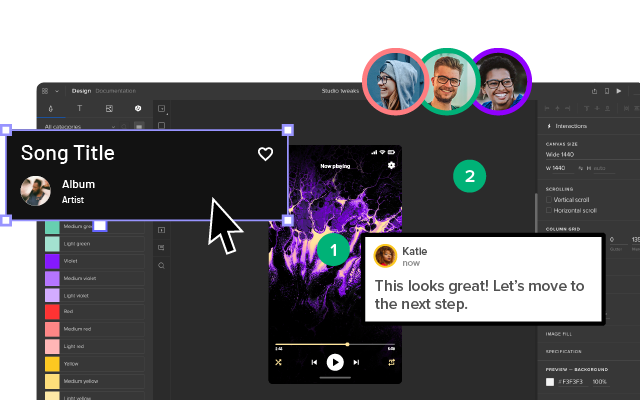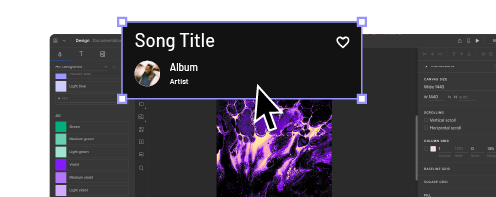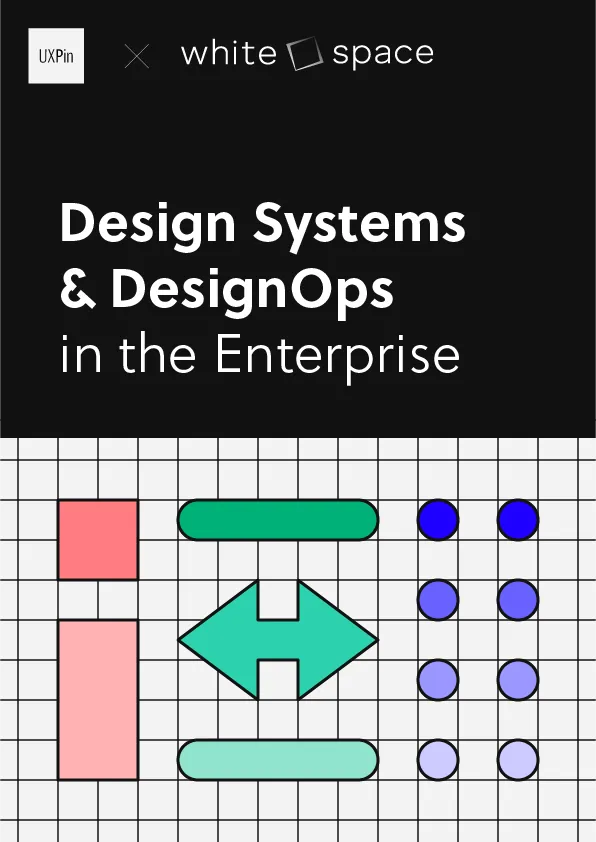The Secrets of Effective Design Teamwork
Today’s designs often require the work of multiple professionals who have experience in areas like graphic design, animation, and coding. Whether you have two people or two dozen people working on a project, perfecting your approach to team design will streamline your processes and lead to better results.
The talents and personalities of your colleagues may influence how your team design projects, but you can typically rely on the following steps to make your work more effective.
Ready to start your next design team project? There’s no better tool than UXPin, an end-to-end advanced prototyping solution for making collaboration easier. UXPin allows you to build interactive prototypes, share them with others, and ship them to development. Start a free trial.
Select design team members wisely
Effective design teamwork starts with having a team with the skills you need to complete the project. Team composition is crucial, so make sure you choose members for the team design who can work together. That doesn’t necessarily mean selecting people who get along well—although that could play a role, too.
Things to consider when selecting design team members include:
- Whether they work during the same hours as other people.
- The skills they bring to the team.
- How well they follow guidelines to keep the project on track.
You may have talented designers in your agency that don’t fit some projects. You don’t always need the best of the best. You need a team that can work toward a common goal.
Make an inventory of everyone’s skills
Don’t assume that everyone will fill a specific role during the team design project. As you move through design phases, it helps to know everyone’s skills so you can assign them tasks instead of forcing them to sit idle.
Your illustrator might have experience with animation. In today’s workplace, your illustrator might even have experience with development. They might not have the skills to develop a website or app, but they could have enough basic front-end knowledge to move the first stage of the project along. That will speed things up for the team and boost your illustrator job satisfaction.
Choose a management methodology that fits your design team
Every design team needs to use a design project management methodology that fits their needs. Popular methodologies include Agile, Scrum, and Kanban.
Agile
Agile prefers vague outlines and goals that make design projects more flexible. It also puts an emphasis on adapting to feedback for ongoing improvement.
Here are some of resources for designers interested in Agile:
- How Agile Environments Revolutionize a Design Team’s Workflow?
- The Definitive Guide for Integrating Agile and UX
- Creating an Agile UX Process with UXPin
- Design Thinking and Agile at IBM
- UX Research for the Agile Software Development Life Cycle
- Best practices for Agile UX Documentation
- Agile for Product Teams
Scrum
Scrum is a version of Agile that uses design sprints that typically end with one or two weeks.
Kanban
Kanban uses a visualized workflow that shows the status of tasks within the project. As tasks move toward the “completed” category, the project draws closer to a conclusion.
Explore those and other project management workflows:
Set clear tasks and deadlines
During a team design, some people have to complete tasks before others can move forward. For example, the developer responsible for finalizing a website’s homepage can’t reach that goal until the graphic designer finishes creating all of the icons and other assets that will appear on the page.
You can integrate setting clear tasks and deadlines into any management methodology. Of course, unexpected things can happen during a project. The animator left a thumb drive at home, so you have to wait an hour while she retrieves it.
Since you know that delays will occur, give team members some flexibility with their deadlines. Make it clear, though, that they must communicate the delay to everyone. Accepting responsibility and solving the problem is good behavior. Sneaking away to fix a problem before others notice is unhelpful behavior that will get noticed eventually.
If you need a project management app to encourage communication, consider popular options like:
You may already use one of these apps for team design projects. If not, try their free trial versions before you commit to an option.
Celebrate the achievements of your team members
Team design can make some people feel anonymous. Eventually, they might start to neglect their work, show up a little late to meetings, or fail to check their messages.
A traditional approach to project management would use negative feedback to hold team members accountable. As a project lead, you may need to pull some people aside to point out their failures. Really, that should be your last option, though. Before you go negative, use positive reinforcement to keep team members encouraged and recognized.
It doesn’t take much to celebrate someone’s achievements. At the end of a mid-day meeting, you might say, “Great work on that layout, Anne. I really like it!” Everyone will hear the praise, which will make “Anne” feel included and responsible in a good way.
You can also celebrate team design accomplishments. Maybe you take a long lunch after meeting a milestone, or you have a pizza party when you send your first prototype off for approval. Gauge your team to choose a reward that they will appreciate.
Read also: Design Team Rituals.
Invite feedback from as many people as possible
It doesn’t take long before design teams can become blind to the problems in their products. When you work on something long enough, cognitive dissonance can make you see what you want to see instead of what’s in front of you.
You can fight cognitive dissonance by asking people outside of your team design project to give you feedback. Fresh eyes might notice irregularities immediately. That interactive arrow that the design team thought users would intuitively swipe might baffle a new person who picks up the product.
UXPin makes it easy for you to get feedback from as many people as possible. Once you make a prototype of your product, you can send a link to anyone and request feedback. They don’t need UXPin accounts to view your work and leave comments. By removing barriers, UXPin makes it more likely that colleagues and testers will take a few minutes to explore your product and give you feedback.
Use tools that offer features for real-time collaboration
As more companies move employees and freelancers to remote positions, you may not always have chances to gather your team in one place. Some people will miss the camaraderie of in-person collaboration. Remote work, however, has become increasingly normal. About 70% of business founders expect that they will let at least some of their employees work remotely even after the coronavirus pandemic ends.
UXPin makes it easier for design teams to adjust to remote collaboration by giving everyone a virtual environment where they can work together in real-time. If you can use Google Docs, you can use UXPin’s collaborative features. When one person changes the design, everyone sees the change happen simultaneously. It doesn’t matter whether your teammates are across the hall or on the other side of the world.
Try UXPin to improve team design projects
Most design teams find that they get terrific results when they choose UXPin because the tool gives them features for real-time collaboration, creating design systems, and making prototypes easily.
Sign up for your free trial today so you can experience the benefits that companies like HBO and PayPal get from UXPin.




